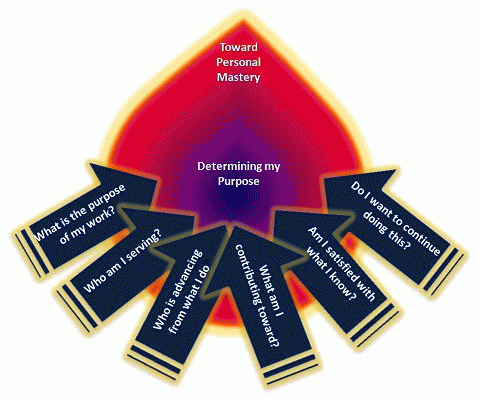One of the steady readings in an MBA course I facilitate on organizational behavior is a section of Peter Senge's 1990 work, "The Fifth Discipline," in which he discusses the five elements of learning organizations. Since his analysis of learning organizations, Senge has expanded his view to learning schools, using the same principles. And indeed: these principles work well in practically every environment. In a nutshell, they are:
1. Systems thinking, which is the overarching principle that ties all other principles together in an awareness of the synergistic connection of all factors involved.
2. Personal mastery, which is crucial to get a learning process going, because there is no learning without the will to master something, and organizations only learn when the people in them learn.
3. Mental models, which are the ideas and mindsets we hold about things: the images that create our reality; the way we see the world.
4. Building shared vision, which is critical in getting everyone motivated toward a common goal.
5. Team learning, which occurs when a team is structured in such a way that the outcomes of the team are rewarding and in line with the visions of the team members.
While there are interesting and deep deliberations to be made about all elements, it is oftentimes the element of "personal mastery" that appeals most to the MBA students in my workshops, of which the majority are working adults. Not from a self-serving perspective, but more from the understanding that personal mastery is only achieved when one engages in work one likes. The students then start contemplating further and often come to the conclusion that their current job is not a place where they necessarily want to attain personal mastery, because they have no intentions to continue doing what they do there. In other words, the age-old adage from the wise Confucius kicks in "Do what you like and you never work a day in your life." The students suddenly awake to the awareness of passion. Most people only want to attain mastery in an area that they are passionate about. So, the consequential realization is that they have to start doing some self-exploration in order to find their purpose in life.
A few things I remind them at this point are:
1. Be careful about engaging in other people's purpose: it's easy to fall prey to doing what everybody else does; or what your peers, parents, or partner, want you to do. But that has proven to be a disaster in many cases.
2. Understand that not everyone has the same notion of purpose. A fulfilling or rewarding job means different things to different people. It is important to figure out what it means to you.
3. Even your own, self-defined purpose can be subject to change over time.
I don't bring these points up to discourage them, but rather to prevent them from becoming discouraged when they find in about 5 or 10 years from now that they are no longer attracted to the choices they made way back when. It is no news anymore that today's working person holds more than 20 jobs and multiple careers during their work life, whereas our parents and grandparents were perfectly satisfied with one career, and sometimes even one job! This is not because today's working person is more indecisive, but rather that the speed of change has accelerated tremendously. We are exposed to so much more in our day and age that we cannot dwell in the same old mindset, habit, or behavioral pattern without being sidetracked.
As an interesting sidenote, I have found that even when we maneuver between careers, there are certain things we keep doing. The environments may change, but some basics remain. Reflecting on myself, for example: I am currently in my second career, facilitating courses and communicating to students and other workforce members about the best ways to establish and maintain rewarding work environments. My previous career was in mass media in South America, where I was communicating to viewers and listeners about women's awareness, the power of reading, responsible traveling, good work ethics, you name it.
The key component that transcended throughout my careers till this point is motivational communication. That means, hence, that motivational communicating, regardless of the form, environment, or topic, is the foundational passion so far in my life.
While it may not always be possible to make a job from your hobby, it is possible to find gratification in multiple work settings. The basic requirement to attain this is awareness of the big picture: what is the purpose of my work? Who am I actually serving? Who is advancing from what I do? What am I contributing toward? Am I satisfied with that? As far as I can see now, do I want to continue doing this?
(Note: You can view every article as one long page if you sign up as an Advocate Member, or higher).






